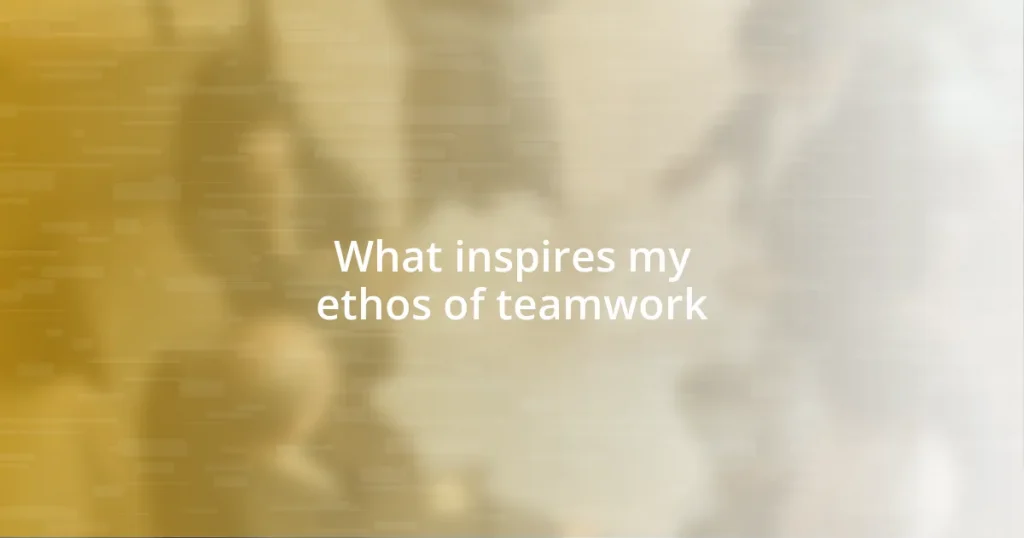Key takeaways:
- Teamwork thrives on trust, communication, and shared goals, fostering stronger relationships and collaboration.
- Implementing regular brainstorming sessions and clear objectives enhances team motivation and creativity.
- Addressing conflict openly and defining roles can resolve tensions and improve team dynamics.
- Creating a positive culture through recognition, open communication, and fun activities strengthens team cohesion.

Understanding the concept of teamwork
Teamwork, at its core, is about people coming together with a shared purpose. I remember a project we undertook at work where each team member brought their unique strengths to the table. It was a revelation to see how collaboration transformed individual contributions into something greater than the sum of its parts.
When I reflect on my experiences, I realize that teamwork goes beyond simply working side by side; it’s about building relationships and trusting one another. Have you ever felt that energy in a team when everyone is aligned? That electrifying synergy is what drives creativity and innovation—it’s like all the puzzle pieces finally fitting together.
Moreover, I’ve learned that communication is the heartbeat of effective teamwork. During one project, we implemented daily check-ins, and it made a world of difference. The open dialogue fostered not just transparency but a genuine connection among us. Isn’t it incredible how sharing ideas can lead to collective growth?
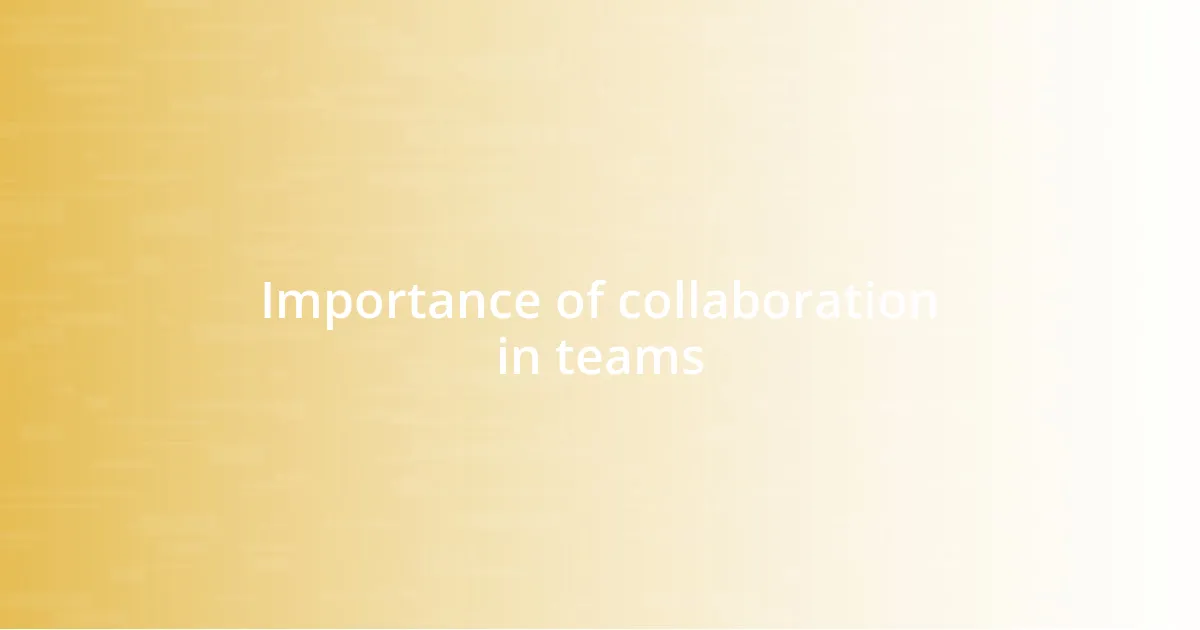
Importance of collaboration in teams
Collaboration in teams is essential for creating a culture of mutual support and understanding. I recall a time when my team faced a tight deadline. Instead of isolating ourselves, we pooled our resources and tackled challenges together. It was remarkable to see how quickly we overcame obstacles when everyone contributed their thoughts and perspectives. It’s a powerful reminder: when we collaborate, we tap into a wider array of ideas and solutions that might otherwise go unnoticed.
In my experience, collaboration fosters a sense of ownership and accountability among team members. During a marketing campaign, we divided tasks based on individual strengths, but we all felt responsible for the project’s success. This shared responsibility brought us closer, making us more engaged and motivated. Have you noticed that when you collaborate, there’s often a sense of pride in what you create together?
Ultimately, effective collaboration not only enhances productivity but also nurtures positive relationships within the team. I once participated in a workshop focused on team dynamics, and it highlighted how collaborative teams often celebrate each other’s wins. This encouragement builds trust and boosts morale, creating a positive feedback loop. When we support each other, we not only achieve our goals but also build lasting connections that extend beyond work.
| Aspects | Impact of Collaboration |
|---|---|
| Problem Solving | More diverse ideas lead to innovative solutions. |
| Ownership | Fosters accountability and engagement among team members. |
| Relationships | Builds trust and camaraderie, enhancing team dynamics. |
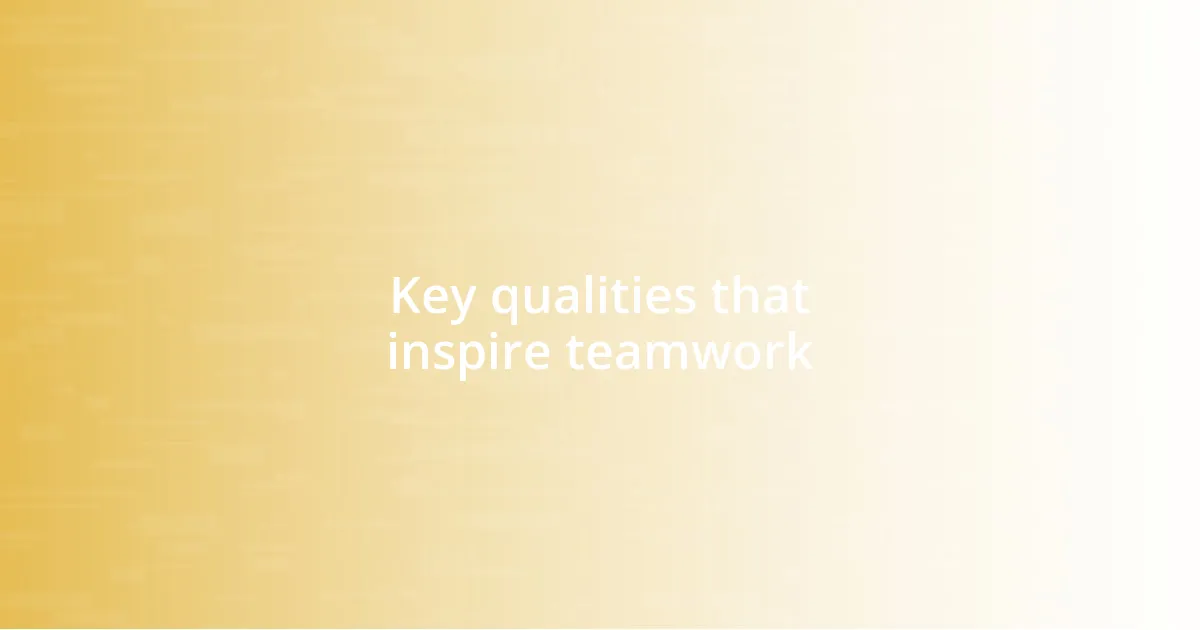
Key qualities that inspire teamwork
Key qualities that inspire teamwork revolve around trust, communication, and shared goals. I’ve found that trust is the foundation of successful teams. In a recent project, I experienced a moment when my team openly expressed our concerns about deadlines. Instead of frustration, we had a candid discussion that not only eased our worries but also reinforced our commitment to support one another. This open honesty created a stronger bond, enhancing our teamwork like never before.
Another key quality is the ability to communicate effectively. I remember a situation where miscommunication almost derailed our project. We learned the hard way how vital it is to clarify expectations. Since that moment, we’ve adopted a culture of frequent check-ins to ensure everyone is on the same page. It’s fascinating how this simple practice transformed our interactions, making everyone feel heard and valued. Here are some essential qualities that I believe drive teamwork:
- Trust: Encourages vulnerability and openness.
- Communication: Ensures clarity and alignment within the team.
- Shared Purpose: Aligns efforts toward common goals, fostering unity.
- Flexibility: Adapts to changing circumstances and ideas.
- Respect: Acknowledges diverse perspectives, enhancing collaboration.
Each of these qualities plays a crucial role in inspiring teamwork and elevating the collaborative spirit within any group.
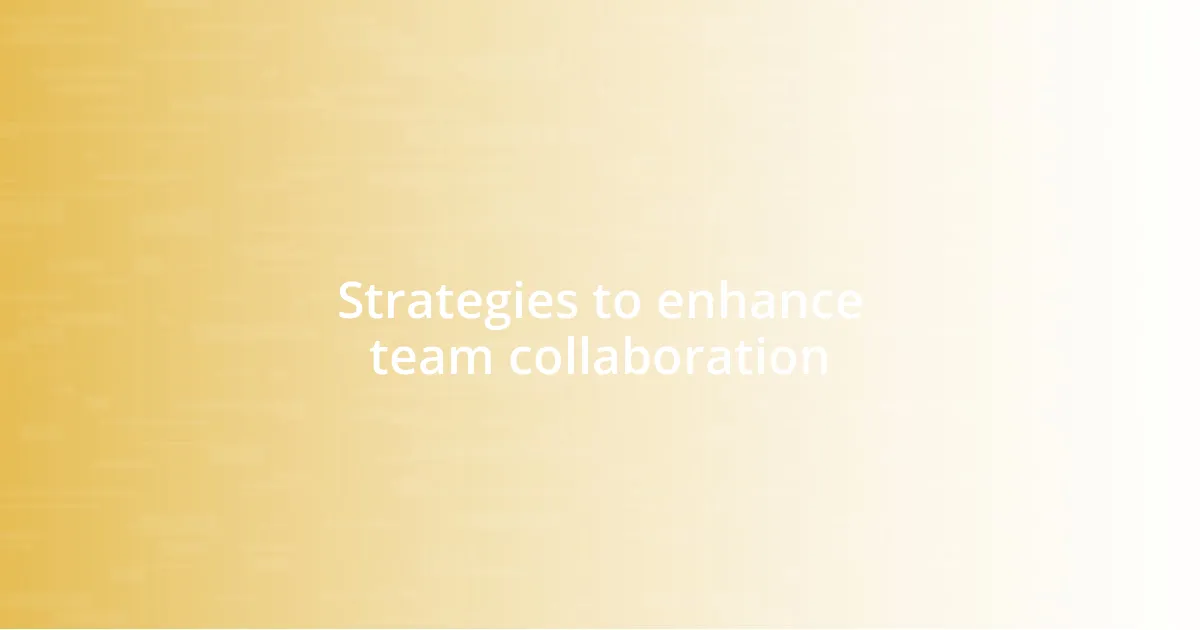
Strategies to enhance team collaboration
One effective strategy to enhance team collaboration is to establish regular brainstorming sessions. I remember when my team decided to dedicate Fridays for creative idea generation. This not only motivated us to think outside the box but also fostered an environment where everyone felt comfortable sharing their ideas, no matter how unconventional. Don’t you think that when people know there’s a safe space to express themselves, they’re more likely to contribute openly?
Another powerful approach is to set clear, shared objectives that everyone can rally behind. In one project, we launched a shared vision board that tracked our goals and milestones. This visual reminder kept us aligned and engaged, encouraging each member to stay focused on our collective success. It’s interesting how having a tangible reminder can elevate a team’s motivation, don’t you think?
Incorporating team-building activities into our routine has been another game-changer. I once participated in an outdoor adventure challenge that required us to rely on each other’s strengths to complete tasks. The experience not only strengthened our relationships but also translated into better collaboration during work hours. Can you recall an instance where stepping outside the usual work setting helped bond your team? These moments of connection often lead to increased synergy back at the office.
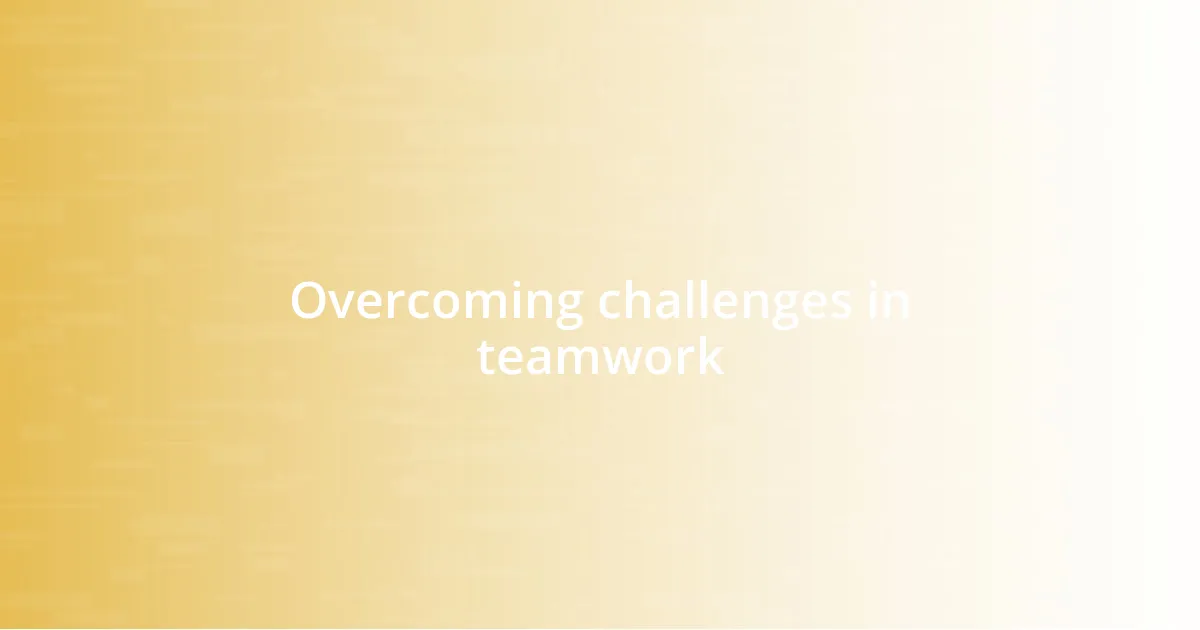
Overcoming challenges in teamwork
One of the most significant challenges I faced in teamwork involved differing perspectives on project direction. I vividly remember a time when our approaches clashed, leaving the team divided. Instead of allowing this tension to fester, we decided to hold a dedicated session where everyone could articulate their viewpoints without judgment. This transparent dialogue not only cleared the air but also led to a creative compromise that synergized our varied ideas. Isn’t it amazing how addressing conflict head-on can actually propel us forward rather than hold us back?
I’ve also noticed that ambiguity in roles can create friction within a team. In a past project, we faced confusion about responsibilities, which led to duplication of effort and frustration. To overcome this, we took a step back and clarified each person’s role, ensuring everyone understood their unique contributions. This not only alleviated stress but also allowed us to appreciate one another’s strengths in a more profound way. Have you ever realized that defining roles can not only streamline efforts but also build respect among teammates?
Lastly, the emotional component of resilience is crucial when tackling setbacks as a team. I recall a moment when we faced an unexpected obstacle that threatened to derail our timeline. Instead of blaming one another, we focused on lending moral support and brainstorming solutions together. That experience taught me that cultivating a culture of resilience and empathy can significantly shift the team’s dynamic, transforming hurdles into shared victories. When was the last time your team rallied together to conquer a challenge, and how did that experience strengthen your bond?
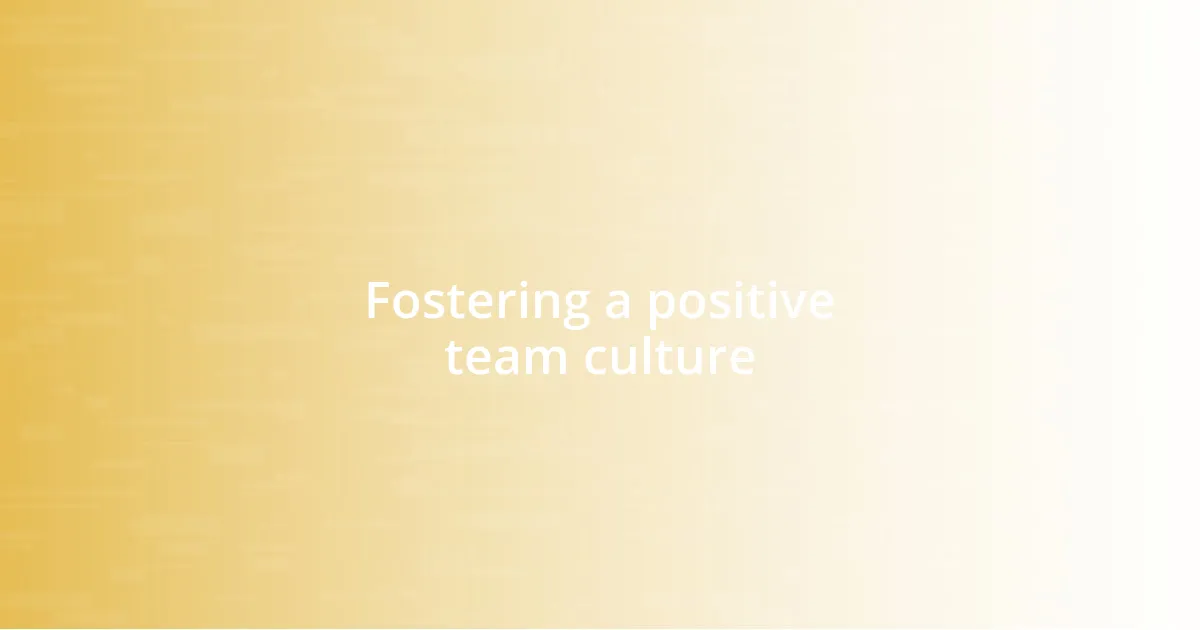
Fostering a positive team culture
Creating a positive team culture starts with genuine recognition and appreciation. I once worked with a colleague who always made it a point to celebrate even the smallest victories. This simple act not only lifted team spirits but also instilled a sense of belonging. When everyone feels acknowledged, isn’t it likely that they’ll put in their best effort?
Equally important is fostering open communication. I remember a project where we implemented an anonymous feedback system. The insights we gained were eye-opening; team members felt free to express their concerns without fear of judgment. It struck me how empowering that was—when individuals can voice their thoughts, it nurtures trust. Have you ever witnessed an environment where fear of speaking up stunted growth? It can be a game-changer when everyone feels heard.
Lastly, integrating fun into our daily routine can really enhance team morale. I once organized a “theme day” where everyone dressed according to a fun concept, which led to lots of laughter and light-hearted interactions. It felt refreshing to step away from our usual roles and connect on a personal level. Doesn’t it make sense that when people laugh together, they create bonds that make collaboration feel more like a joint adventure?










